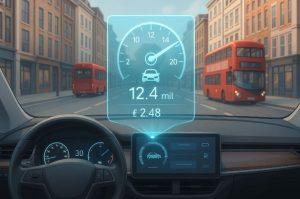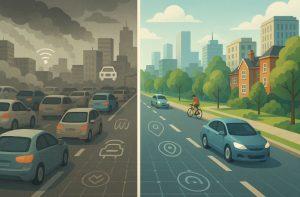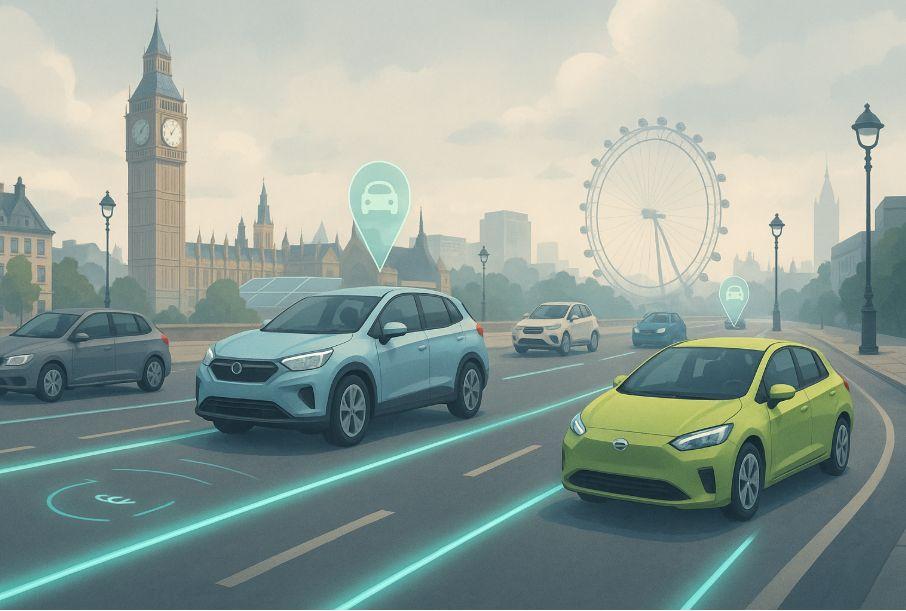Rachel Reeves’ proposal for a pay per mile tax has generated widespread attention and debate in the UK, especially in London where road use and congestion are already hotly contested topics.
As the shift toward electric vehicles accelerates, the government faces the challenge of replacing declining fuel duty revenue. While this proposal aims to address that issue, it has also raised questions about fairness, feasibility, and its potential impact on different groups of drivers.
What is the Pay Per Mile Tax Proposed by Rachel Reeves?
 The idea of a pay per mile tax involves charging motorists based on how many miles they drive, rather than levying taxes based on fuel consumption or fixed annual rates. Rachel Reeves, as Shadow Chancellor, has expressed interest in exploring this model as a way to future-proof public revenue streams and make taxation more equitable.
The idea of a pay per mile tax involves charging motorists based on how many miles they drive, rather than levying taxes based on fuel consumption or fixed annual rates. Rachel Reeves, as Shadow Chancellor, has expressed interest in exploring this model as a way to future-proof public revenue streams and make taxation more equitable.
While the specifics are still under consideration, it’s believed the system could involve mileage tracking through vehicle odometers or GPS technology. The proposed tax would apply to all drivers, regardless of fuel type, meaning that even electric vehicle users who currently benefit from zero fuel duty would start contributing to road upkeep costs.
Why is the UK Considering a Shift From Fuel Duty to Mileage-based Taxation?
The UK government currently earns over £25 billion annually from fuel duty, a revenue stream that is steadily shrinking as more people switch to electric vehicles. With the government’s ambition to phase out new petrol and diesel cars by 2035, fuel-related tax revenue will continue to fall sharply.
This decline poses a major financial issue. Roads still require maintenance, and infrastructure upgrades are ongoing especially in urban centres like London. A mileage-based tax is being considered as a viable replacement, ensuring that all drivers contribute fairly to the cost of using public roads, regardless of the vehicle they drive.
How Would a Pay Per Mile Tax Affect London Drivers Specifically?
For London drivers, the impact of a mileage-based tax could be more complex due to the existing range of charges already in place. The capital currently enforces a Congestion Charge, Ultra Low Emission Zone (ULEZ) fees, and in some areas, local parking levies. Introducing a mileage tax on top of these could result in a significant increase in daily driving costs.
While it’s possible that some of these existing charges could be streamlined or replaced, there’s concern that drivers in Greater London could face double or even triple taxation unless policy changes are carefully coordinated. Those who rely on their vehicles for daily commutes or for business could be disproportionately affected, particularly if the new tax does not offer exemptions or discounts.
What Are the Potential Benefits of a Road Pricing System?
 Despite its controversy, the proposed road pricing model has some clear advantages. Charging drivers based on how much they use the roads introduces a sense of fairness that flat vehicle taxes or emissions-based charges may not always achieve. Those who drive less would pay less, which could encourage people to rethink unnecessary car journeys and adopt more sustainable alternatives.
Despite its controversy, the proposed road pricing model has some clear advantages. Charging drivers based on how much they use the roads introduces a sense of fairness that flat vehicle taxes or emissions-based charges may not always achieve. Those who drive less would pay less, which could encourage people to rethink unnecessary car journeys and adopt more sustainable alternatives.
In addition, this system could provide valuable data to help local and national governments better understand road usage patterns. This data could then inform infrastructure planning, traffic control measures, and environmental initiatives. By directly linking usage with cost, it also supports broader climate policies aimed at reducing emissions and congestion.
Why Are Electric Vehicle Owners Concerned About This New Tax?
Electric vehicle (EV) drivers have enjoyed numerous tax benefits and exemptions as part of the UK’s strategy to promote cleaner transport. These incentives include exemption from fuel duty, Vehicle Excise Duty (VED), and often from congestion and emission charges in urban areas.
A pay per mile tax would end this advantage. Even though EVs produce no tailpipe emissions, they still contribute to road wear and congestion.
This proposed tax, while arguably fair in principle, could dampen the incentive to adopt electric cars if not implemented alongside continued support and subsidies. For EV owners, the fear is not just financial. it’s the possibility that the government may be backtracking on its environmental commitments.
What Criticisms Has the Pay Per Mile Tax Received From the Public and Experts?
Public and expert responses to the proposal have been sharply divided. Privacy is one of the most frequently cited concerns, especially if the system relies on GPS tracking. People worry about government surveillance and how their location data might be used or stored.
Affordability is another key issue. For people on lower incomes, especially those living in rural areas with limited public transport, the new system could increase travel costs significantly. Critics argue that it could become a regressive tax that disproportionately affects those who have the fewest transport alternatives.
Experts have also highlighted the logistical challenges involved. Setting up a national mileage-tracking and billing system would be both technically complex and expensive. Without careful planning and transparency, it risks becoming a bureaucratic burden for drivers and an administrative headache for the government.
Is the Pay Per Mile Tax Aligned With the Uk’s Green Transport Goals?
 At face value, the pay per mile system supports several elements of the UK’s green transport agenda. It discourages excessive car usage, reduces urban congestion, and indirectly promotes the use of public transport and cycling. All of these outcomes are consistent with the government’s aim of achieving net zero emissions by 2050.
At face value, the pay per mile system supports several elements of the UK’s green transport agenda. It discourages excessive car usage, reduces urban congestion, and indirectly promotes the use of public transport and cycling. All of these outcomes are consistent with the government’s aim of achieving net zero emissions by 2050.
However, the policy could send mixed signals. If EV drivers feel they are being penalised despite switching to greener vehicles, it may slow down the transition to low-emission transport. The tax must therefore be introduced in a way that maintains incentives for cleaner cars while ensuring fairness and sustainability across the board.
Could This Tax Disproportionately Impact Low-income or Rural Drivers?
One of the most pressing concerns around the pay per mile tax is its potential impact on people with fewer transport options. In rural parts of the UK, where public transport is sparse or non-existent, driving is often a necessity, not a choice. A flat mileage rate could hit these communities the hardest.
Similarly, lower-income families and workers who rely on their cars for commuting, school runs, or shift work may find themselves paying more under the new system. Unless safeguards are built into the policy such as discounts or exemptions for certain groups. it risks deepening regional and socio-economic inequalities.
What Alternatives Are Being Suggested to the Pay Per Mile Model?
Several alternatives to a straightforward mileage tax have been proposed. Some experts suggest a hybrid model that combines distance driven with vehicle emissions, maintaining a level of environmental accountability. Others recommend congestion-based pricing that varies by time and location, targeting high-traffic areas and peak hours.
Another idea involves vehicle subscription models, where motorists pay a monthly fee based on estimated usage. This could simplify billing while offering predictable costs. There’s also the possibility of reforming existing road and fuel taxes to reflect actual road usage more accurately, avoiding the need for a whole new system.
How Likely is the Pay Per Mile Tax to Be Implemented Under Rachel Reeves?
 At this stage, the pay per mile tax is not a confirmed policy but a proposal under consideration. Rachel Reeves and the Labour Party have acknowledged the looming revenue problem posed by declining fuel duty but have yet to commit to a specific timeline or mechanism.
At this stage, the pay per mile tax is not a confirmed policy but a proposal under consideration. Rachel Reeves and the Labour Party have acknowledged the looming revenue problem posed by declining fuel duty but have yet to commit to a specific timeline or mechanism.
Its implementation will depend heavily on the outcome of future elections, public consultations, and feasibility studies. There’s also the political challenge of rolling out a potentially unpopular tax during a cost-of-living crisis. That said, the groundwork is being laid for a new road pricing model to replace outdated taxation systems.
What Should Motorists in London Prepare for?
Motorists in London should begin to consider how a mileage-based system might affect their routines and finances. While nothing is confirmed, it’s wise to track average weekly mileage and assess whether alternative transport options are viable.
For those operating fleets or delivery services, evaluating current driving patterns and fuel usage can help in anticipating future costs. As the political landscape evolves, staying informed about policy updates and proposals will be key for all drivers across the city.
Conclusion
The proposed pay per mile tax represents a significant shift in how the UK might fund its roads and manage congestion in a rapidly changing transport landscape. While the rationale behind it is sound especially given the decline of fuel duty revenue. it’s clear that the proposal brings with it complex questions around fairness, privacy, and accessibility.
If introduced thoughtfully, with safeguards for vulnerable groups and incentives for sustainable travel, the system could provide a fairer and greener approach to road funding. But without careful planning and consultation, it risks alienating many drivers and undermining the push toward cleaner transport. The controversy surrounding the proposal underscores the need for a transparent and inclusive national discussion.
FAQs
How does pay per mile tax differ from the current system?
Unlike traditional road tax or fuel duty, pay per mile taxation charges drivers based on the distance they travel, making it a usage-based system.
Will this new tax affect electric vehicles too?
Yes. Electric vehicles, which currently benefit from tax exemptions, would also be subject to charges under a mileage-based system.
Is tracking vehicle mileage a privacy concern?
It can be. If GPS is used to monitor mileage, concerns may arise over how location data is stored and used by authorities.
Could the tax be higher in urban areas like London?
Possibly. The system may include variable rates depending on location, traffic congestion, and peak travel times.
What are the main arguments in favour of the tax?
Supporters argue it’s fairer, more sustainable, and better suited to the rise of electric vehicles than the current fuel-based system.
Are there exemptions proposed for essential drivers?
While details are unclear, proposals may include exemptions or discounts for key workers, low-income drivers, or rural communities.
When would this tax be implemented?
There’s no set timeline yet. The idea is still under review and would likely follow public consultation and technical trials.








